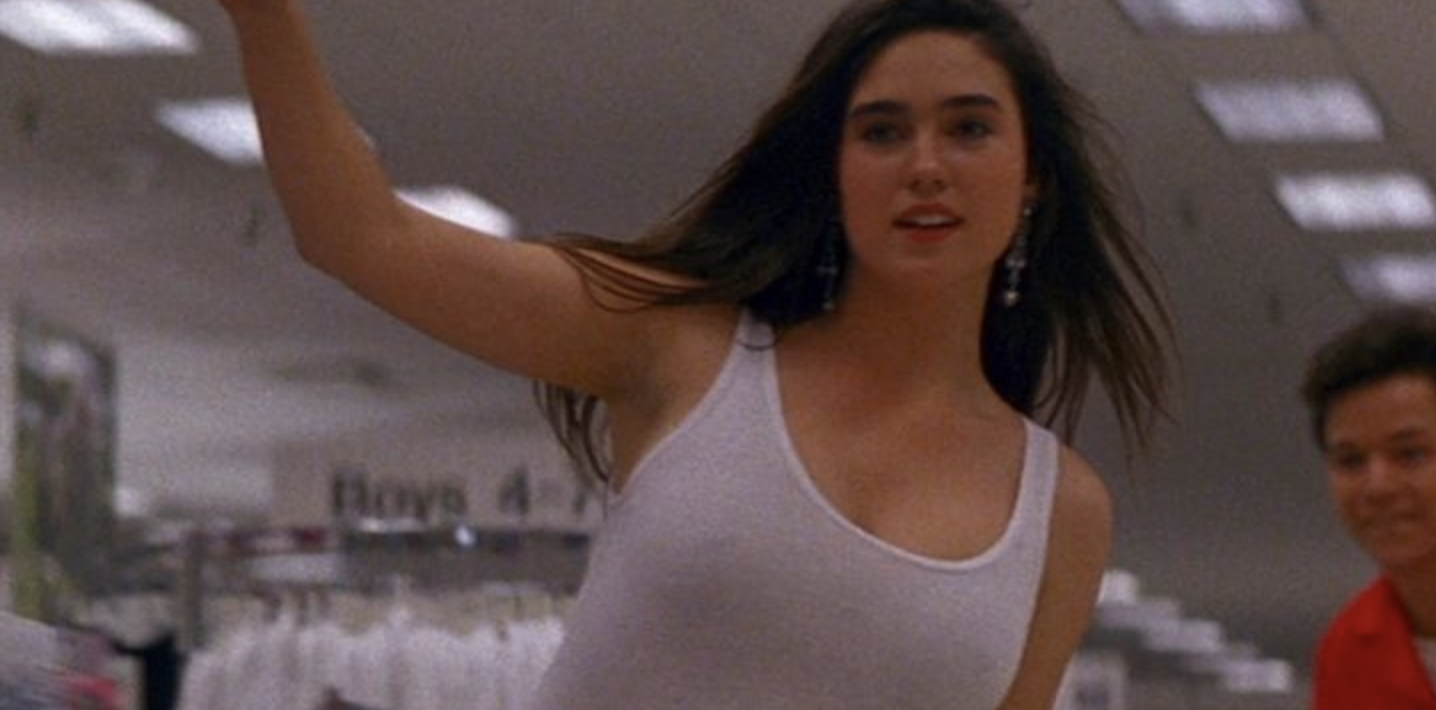Career Opportunities (1991) is like watching someone try to sell you a dream through a paper cup. John Hughes wrote it, Bryan Gordon directed it, and somewhere in the back, a drunk copywriter was shaking his head. The plot’s a glimmer: boy meets rich girl, they’re trapped in a Target overnight, hijinks ensue—but it’s all wrapped in the dull hum of “middle-of-the-road.”
Frank Whaley is supposed to be your charming everyman, your Ferris Bueller stand-in, but he’s more like a cardboard cutout in a neon-lit store aisle. He exists, sure. Moves a little. But try to feel anything through him and you’ll just feel the flicker of a bad fluorescent light.
Then Jennifer Connelly walks in, and the air changes. She’s absurd—absurdly beautiful, absurdly alive, like she could walk out of the Target and drag the whole universe behind her. Curves, eyes, presence—it’s not just acting, it’s gravity. Every frame she touches, the movie forgets everyone else exists, including poor Whaley, who’s still blinking like he just remembered he was cast. Hughes’ charm? Muted. Your cheap laughs? Half-hearted. But Connelly—god, she makes the chaos worthwhile. A fantasy flickering under fluorescent lights, while the mop bucket stinks and the clock ticks like a drill.
Plot-wise, the movie is basically Ferris Bueller in Target: Jim Dodge, the lazy dreamer, gets stuck overnight in a big-box store with a rich girl who’s pretending to be rebellious. Cue the obligatory hijinks: roaming aisles like small-town royalty, dodging incompetent crooks, and somehow, improbably, turning a cheap Target into a Hollywood backdrop for romance. The criminals are so inept you wonder if the film itself was pulling for their success just to spice up the otherwise dull proceedings. Meanwhile, Whaley’s Jim is supposed to be charmingly roguish, but mostly he’s bland, the kind of “everyman” that makes you think the film mistook mediocrity for relatability.
Dermot and Kieran Mulroney as Nestor and Gil are decent comic foils, though, which is nice, and there’s the faint pleasure of spotting a very uncredited John Candy as the Target manager—like spotting a rare bird in an otherwise drab aviary. But honestly, the film’s biggest energy comes from Connelly’s presence; without her, it would be a forgettable cash-in on John Hughes’ name. Hughes himself even admitted it, calling it a disappointment, which is about as subtle as slapping the audience in the face with a wet mop.
Still, it’s not a disaster. The film has its moments: the closed-store freedom allows for some whimsical exploration, a touch of mild tension with the crooks, and that Hughes’ sprinkle of small-town charm. It’s easy to see why it’s developed a cult following; there’s a certain nostalgic appeal to roaming a Target after hours with someone impossibly beautiful while everyone else in your life is oblivious. But let’s be honest—the movie is middle of the road, and Whaley’s presence doesn’t elevate it beyond that. He’s an adequate canvas, but mostly, you’re just waiting for Connelly to appear and remind you that beauty can make even mediocrity almost tolerable.



